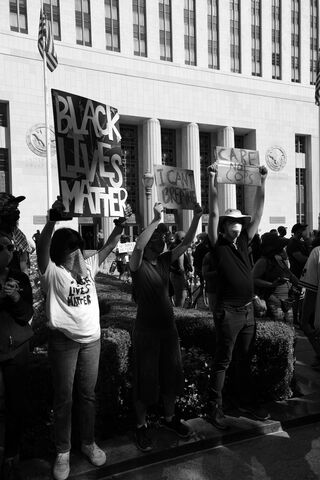President Donald Trump
Will Trump Be Re-elected?
Here are 4 social science reasons to think so.
Posted October 11, 2020 Reviewed by Gary Drevitch

With the election just weeks away media and expert speculation abounds: Will Trump be re-elected? Most recent public opinion polling suggests not. As we learned in 2016, however, public opinion polling is not infallible. Polls just weeks ahead of the 2016 election had Hillary Clinton considerably ahead. And yet, we’re near the end of Trump’s first term.
Where else can we turn for insight into whether Trump will be re-elected?
Broader social science may have something to say. Empirical research and behavioral theory can at least help us understand the many factors at play, and perhaps prognosticate just as effectively (or more so) than public opinion polls.
What does the social science say about Trump’s support and re-election chances?
I like Trump’s chances of being re-elected. A lot. A reading of scientific literature from fields such as social-personality psychology, political science, and public administration suggests that, despite recent public polling, there are at least four reasons to anticipate that the incumbent will be re-elected.
1. The winds of social norms have shifted in Trump’s favor. Social science data point to the rise of the “Trump Effect.” During the 2016 Presidential campaign, Trump’s prejudicial rhetoric shifted what we consider common or socially acceptable in political discourse. Since that time, prejudice has been mainstreamed. It has become socially and politically acceptable to engage in prejudicial expression and behavior, ranging from microaggressions to hate crimes.
What does the “Trump Effect” mean in terms of his re-election? For one, a team of Texas A&M scholars showed that voting for conservative political parties focused on nativism (e.g., White culture, anti-immigrant sentiment) benefit from increased voting. In the United States, this comes at a cost for the opposing political party. Moreover, lower-class Whites tended to vote for Trump due to racially- and immigration-based, as opposed economic, beliefs. Interestingly, White female Trump voters are more often characterized by high degrees of sexist beliefs. Sexist appeals may actually have a counterintuitive impact of sorts by activating pro-Trump voting among women. In all, our collective acceptance of expressed political prejudice by Trump will likely aid his re-election efforts.

2. Trump’s base is stable. Trump supporters are loyal. And they are so in spite of seemingly any event, appeal, or use of misinformation. But why?
Social science research has shown that his supporters tend to be high in characteristics such as social dominance orientation and authoritarian aggression. They also tend to have lower verbal intelligence. What’s more, such characteristics appear to be resistant to attitude change. They likely won’t change their strongly held beliefs, even in the face of new or correct information. In fact, one study showed that Trump supporters may overestimate their agreement with his policies. Supporters also tended to express defensiveness and negative emotional reactions when confronted with their disagreement. In short, the combination of these characteristics may make Trump voters impervious to facts.
The implications of these personal characteristics for Trump’s re-election are clear. His base responds to a predictable set of political messages and appeals. Further research provides insight into how this may occur. For instance, an interdisciplinary team of researchers demonstrated that narrative political messaging can heighten intent to vote for a preferred candidate through activation of anger. Trump’s consistent theme may in fact target his supporters’ preference for authoritarian aggression, increasing the likelihood of votes from his base.

During an era where policing and civil rights violations such as the death of George Floyd are so prominent, we might expect the fervent protest to benefit liberal voting. A recent study, however, shows conservative voting may actually benefit from the salience of racial injustice during a Presidential campaign. For instance, one study reported findings that Trump voting was associated with his effective 2016 campaign use of dog-whistle pro-police messaging in response to the Black Lives Matter movement; the strategy was particularly effective in targeting persons high in racial resentment. Also, experimental evidence suggests that exposure to images of militarized police may drive voting choices in support of Trump among conservatives. (Notably, the effect worked for desired candidates regardless of political identity or party.)
As Trump’s campaign has continued employing prejudice-driven strategies in the 2020 Presidential race, it is likely the approach is sound and replicable. His 2020 theme of racially-motivated messaging may actually yield more benefit than in 2016 given how the social norms have shifted to make prejudice more socially acceptable. Moreover, given his campaign's repeated use of militarized policing images, this may appeal strongly to and activate persons voting for him.

3. Grievances have not subsided. A strong driving force of Trump’s 2016 election was seen in many of his voters demanding “something different” for having been wronged by prior administrations. As summarized in a recent review, a culture of grievance exists among White, Christian, and lower-income conservatives for having been victimized by the political establishment. Despite some of Trump’s policies in fact damaging these groups, the culture of grievance persists and likely motivates continued support for Trump. This may be especially the case in heartland and Southern battleground electoral states should conservative messaging effectively capitalize on the culture of grievance.
4. Liberal support and turnout may not be as strong as you’d think. The Biden-Harris ticket inspires hope for many. And yet, social science provides at least some rationale to doubt this hope. One reason has to do with perceptions and support of racial minority candidates among liberals. It is well-documented that we rely on heuristics or mental shortcuts for our decision-making. In the instance of liberals responding to Harris, there may be a counter-intuitive pattern to come. Experimental evidence suggests that, when liberals are cognitively taxed, they respond more negatively to candidates of color. With the myriad challenges such as economic strain, health threats, and (mis)information overload at present, it is not out of the realm of possibility to see a scenario in which mentally taxed liberal voters do not respond as strongly or positively to Harris as the Democratic party would have hoped. This may lessen turnout among liberal voters.
Of course, a great deal more social science work exists worth considering. What remains plain as day, however, is that considerable reason exists to expect Trump’s re-election. If it happens, we can all say social science told us so.




